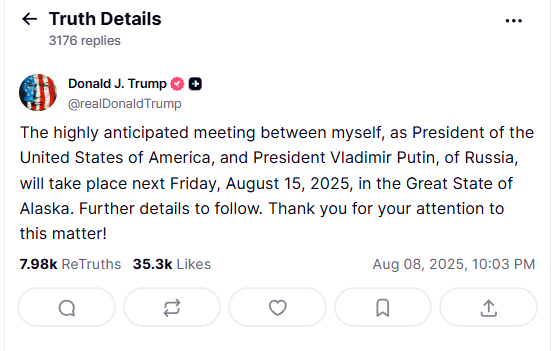Twice-failed presidential candidate Hillary Clinton made a rare concession this week, suggesting that President Donald Trump could be worthy of the Nobel Peace Prize — under the right circumstances. Speaking on Jessica Tarlov’s Raging Moderates podcast, Clinton acknowledged Trump’s ambition for the award and even went so far as to say she would nominate him herself if he ended the Russia-Ukraine war without giving ground to Russian President Vladimir Putin.
“He very much would like to receive the Nobel Peace Prize,” Clinton said, before adding, “Honestly, if he could bring about the end to this terrible war, if he could end it without putting Ukraine in a position where it had to concede its territory to the aggressor, could really stand up to Putin — something we haven’t seen, but maybe this is the opportunity. If President Trump were the architect of that, I’d nominate him for a Nobel Peace Prize.”
Clinton was quick to clarify her motive: “Because my goal here is to not allow capitulation to Putin.”
Her remarks land just as Trump embarks on a high-stakes meeting with Putin in Anchorage, Alaska — an encounter announced a week ago and now drawing global attention. “The highly anticipated meeting between myself, as President of the United States of America, and President Vladimir Putin, of Russia, will take place next Friday, August 15, 2025, in the Great State of Alaska,” Trump declared.
In his typical straight-to-the-point style, Trump has said he’ll be able to judge within minutes whether the meeting will be productive, warning that a bad meeting would end “very quickly.” The diplomatic challenge ahead is steep: both Russia and Ukraine claim to want peace, but only on their own terms, and those terms remain sharply at odds. Ukraine insists talks can’t start until a ceasefire is in place, while Russia treats a ceasefire as the end goal — preferring to negotiate while fighting continues. This clash of approaches has fueled accusations from Western leaders and Ukrainian President Volodymyr Zelensky that Moscow is negotiating in bad faith.

Still, Trump has signaled that his priority is results, not ceremony. “I’m not doing this for my health. I don’t need it. I’d like to focus on our country — but I’m doing this to save a lot of lives,” he said on the way to Alaska. His willingness to sit down directly with world leaders, even adversaries, reflects an approach aimed at cutting through bureaucracy and delivering tangible outcomes.
The moment has not gone unnoticed among faith leaders. Christian evangelist Franklin Graham called on Americans to pray for the president as he enters the meeting. “Today is the day. Join me in praying for our President, @realDonaldTrump, as he meets with President Putin in Anchorage, Alaska,” he urged on X. “Pray that God will give President Trump His wisdom that surpasses all understanding. And pray for President Putin, that God would work in his heart to bring peace and an end to the bloodshed. I believe there will be millions of Christians in Ukraine and Russia praying as well. Peace will benefit not just Russia and Ukraine, but the entire world.”
In a political climate where praise across party lines is rare, Clinton’s remarks stand out. Whether she’s sincere or simply acknowledging the magnitude of the moment, the fact remains: if Trump pulls this off, even his fiercest critics might have to admit he earned it.




















